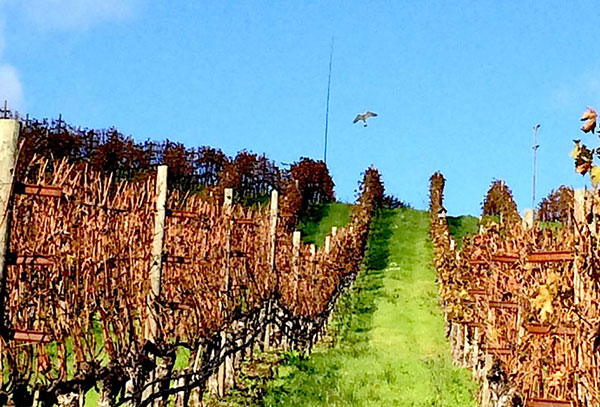Every year in California alone, vintners and farmers lose millions of dollars to birds feeding on their grapes, seeds, and crops. Veraison is a particularly difficult time for vineyards. Grapes are at their most vulnerable when they are approaching their peak – birds love those juicy berries!
To combat this force of nature, growers have traditionally tried expensive and labor-intensive methods of mitigating bird damage in their vineyard. Falcon Crop Protection launched The Falcon Frightkite™ to reduce grape loss due to birds in a more effective, environmentally friendly, and cost-effective way than any other solution, including gas cannons, reflective flash tape, sonic sound systems, and netting.

Falcon Frightkites™ save growers 95-100% of the costly damage caused by finches and other small birds flocking into vineyards during and after veraison to eat grapes just as they ripen.
These kites activate small birds’ instinctive fear of their natural predators by simulating a falcon’s shape and movement. When the birds see the Falcon Frightkite™ flying above a vineyard, the entire flock shifts direction to avoid contact with their perceived enemy, providing near-complete protection of the crop.
The long-lasting FrightKites™ are incredibly cost-effective compared with netting or other labor-intensive vineyard protection measures and are simple to install. Growers can recover the cost a FrightKite™ many times over in a single season with the grapes saved from bird damage.

It’s estimated that one FrightKite™ will protect a vineyard area of approximately 1.25 acres. Two FrightKites will create a multiplier effect to safeguard three or more acres because birds perceive the area between the two hunting falcons as a “kill zone.”
“Put simply, birds don’t want to be watching for hunting falcons in two different directions while they’re pecking at grapes,” Falcon Crop Protection points out. “So the circular area between the two falcons is a no-fly zone, up to a point where there is no gap they can identify as an escape route.”
“We have been growing grapes for 34 years here at GlenLyon. I have tried EVERYTHING (except netting) to keep the birds away from pecking at my clusters including AV Alarms, Reflectors, and Fake owls. I even built 4’ x 6’ x 6’ big bird traps to corral the critters. NOTHING works as well as my three Falcon kites! Thanks for inventing them!”
– Squire Fridell of GlenLyon Vineyards & Winery
Falcon Crop Protection can state with confidence that any exclusion method, including netting, has coverage limitations. They say that determining the optimum number of FrightKites™ for complete vineyard protection is best approached on an individual basis, based on vineyard configuration and prevailing wind direction.

“I was sold before I even bought The Falcon Frightkite™,” says customer John Koos in Petaluma. “My neighbors had one for two years, and last year, he harvested 40 tons of grapes without a single bird peck on any of the grapes.”
“The benefit of the FrightKite™ is that it gives you acres of proven protection year after year for a fraction of the cost of anything else on the market.”
“This is the time to act,” says Falcon Crop Protection. “With grape veraison approaching, winery and vineyard managers still have time to install FrightKitesTM and preserve their grape crop.”
Contact one of our partner distributors, Oregon Vineyard Supply Co. at 503-435-2700, or for more information, testimonials from existing customers and orders, go to www.falconcropprotection.com or call 415-789-5007.
August 14, 2020 at 11:20PM
https://ift.tt/3gYLchB
Crop Protection Device Saves 95-100% of Grape Damage in Vineyards - wineindustryadvisor.com
https://ift.tt/3eO3jWb
Grape

No comments:
Post a Comment